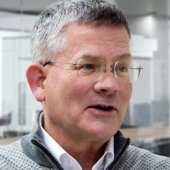Betting on ESG: ING Americas CEO says firm investing billions of dollars toward net zero by 2050
IN BRIEF
- All other things being equal, I believe that the firms that take appropriate action across the full spectrum of ESG will be valued higher than companies that do not.
- We’ve financed — and will continue financing — billions of dollars in green energy projects through green loans and bonds, sustainability-linked products and other financing constructions.
- ING is working with sectors responsible for most greenhouse gas emissions, including power generation, fossil fuels, automotive, shipping, aviation, steel, cement, and commercial real estate.
Gerald Walker is CEO of ING Americas where he is responsible for overseeing ING's business throughout the region. He is a member of ING's Wholesale Banking Management Team. He is a trustee of the Committee for Economic Development in Washington, D.C., and a board member of City Parks Foundation in New York. Previously at ING, he was CEO for UK, Ireland, Middle East and Africa; Global Head of Transaction Services; Global Head of Securities Services; and Global Head of Lending. Walker sat down with Joe Kornik, Editor-in-Chief of VISION by Protiviti, to discuss sustainability, and the future of ESG and its role in the global banking sector.
Kornik: When you think of ESG, do you view it more as corporate responsibility or as a fundamental business shift with seismic strategic implications?
Walker: Over the past decade, there have been those who have been cynical about ESG, with many seeing it simply as a well-intentioned acronym. We now know this cynicism was misplaced. Over the past few years, we’ve seen a sweeping change in the perception of the private sector’s role in society. In the U.S., in 2019, the Business Roundtable put a fine point on this: “A corporation’s purpose is to promote an economy that serves all stakeholders – not only shareholders but also customers, employees, suppliers and communities.” Yes, corporations have a responsibility to generate profits and drive shareholder returns, but we know that the most well-managed organizations around the world do much more than that. I think ESG is more than a “movement.” In fact, corporations have been focused on sustainability for a long time, not simply to protect reputations or respond to environmental or social activists, but to drive operational efficiency and long-term profitability.
Kornik: What do you see as the main drivers of ESG?
Walker: ESG is about building a company’s governance structure to drive the right behavior, meet evolving regulatory requirements and protect employees, customers and communities. It's about cultivating a diverse, engaged workforce that makes a company more adaptive and more inventive – more open-minded to societal complexities – enabling it to better serve an increasingly diverse customer base. And it’s about sharpening a company’s focus on addressing the climate transition and managing associated risk. Environmental, social and governance best practices are now and will remain guiding principles for organizations around the world well into the future.
Kornik: ESG and sustainability encompass many aspects of a business and how it functions. How does ING prioritize the most important aspects of ESG now, and what will they be in the future?
Walker: At ING, our strategy cuts across all three ESG pillars, but climate action remains at our core. Sustainability – and sustainable finance – is about tackling climate challenges, which is what ING’s stakeholders expect from us. We all have a responsibility to define new ways of doing business to balance economic growth with positive environmental and social impact. ING is already well-recognized as a sustainability frontrunner within the financial services industry, especially when it comes to climate action. So, sustainability remains embedded across our organization because we all have a part to play in tackling climate change.
Kornik: Climate is certainly top of mind for many; how do you see the three aspects of ESG impacting each other?
Walker: Each pillar—E, S and G—is closely intertwined with the others. There are climate risks related to environmental events like floods and wildfires; there are transition risks associated with policy interventions and technology developments. There are knock-on social risks related to displacement, discrimination, employee activism and human rights. There are governance implications as companies try to make sense of these interdependencies. To be resilient to these risks, companies need to decode the complexity of these forces, understand business impact and address stakeholders’ divergent demands. That’s a long way of saying each ESG component is equally important. In the very near future, companies’ competitiveness will be determined by their sustainability performance. Actually, that’s already happening. All things being equal, I believe the firms that take appropriate action across the full spectrum of ESG will be valued higher than companies that do not.
Kornik: How will ESG and sustainability impact ING’s operations in the future—for example, the shift to a low-carbon, climate-resilient economy; assessing social risks; and an increased demand for transparency?
Walker: Across ING Group, we monitor and manage our environmental impact closely and believe in being transparent about the climate impact of our operations. We invest in operational efficiency solutions and are sourcing 100% renewable electricity for the buildings we have management control over. We integrate sustainability in our procurement processes and have been compensating for our remaining carbon emissions since 2007. Our science-based targets help keep us on track, and our environmental program will help ensure we meet them.
Kornik: Ultimately, what do you think will be ESG’s business impact on global banking?
Walker: As we look ahead, I expect to see more corporations taking concrete action towards reaching net zero by 2050. Ultimately, it’s the companies in the real economy that bring about change. Banks have a proactive role to play—to finance and advise our clients, to act and lend responsibly and to use our voice to advocate for positive change. We also need to understand the financial implications of the radical changes needed and support the broader economic shift. The global banking industry can make the most impact by engaging with clients and changing sectors from the inside out. While we engage with—and encourage—clients in their transition, we acknowledge that they are, ultimately, the masters of their fate. Nevertheless, each party needs to play its part for us to succeed together in addressing the world’s biggest ESG challenges.
Kornik: What are some ways organizations can collaborate for better outcomes?
Walker: As an organization, we make the biggest impact on sustainability through our financing of companies, especially large companies, which is the business I oversee in the Americas as CEO. We’re steering hundreds of billions of dollars in our loan book towards achieving net zero by 2050. We call this deep collaborative effort our Terra Approach, which enables us to advise and finance clients in making the transition to sustainable business models. These types of conversations have resulted in us recently providing financing to companies like FedEx, CEMEX and Aligned, which set new standards for sustainable finance in their respective industries. At the moment, we are working with the sectors responsible for most greenhouse gas emissions, including power generation, fossil fuels, automotive, shipping, aviation, steel, cement, and commercial real estate. However, it’s important to remember that no one industry, much less one financial institution, has the ability to solve the world’s problems. We believe that an inclusive approach—working with our clients—is the only way we can make any meaningful impact.
I believe the firms that take appropriate action across the full spectrum of ESG will be valued higher than companies that do not.
Kornik: Speaking of clients, how do you think they are viewing a future more focused on ESG?
Walker: Boardroom attention is clearly increasing as stakeholders, shareholders, customers and employees demand more accountability and action on ESG promises. Our clients appreciate the role ING has played in helping them meet—or make strong progress against—their own ESG and sustainability agenda. And as a general principle, we believe helping clients improve is more effective than excluding clients altogether. We’ve financed—and will continue financing—billions of dollars in green energy projects through green loans and bonds, sustainability-linked products and other financing constructions. In some cases, we may respond to certain financing requests with “yes, but…,” outlining sustainability improvements the client must make first, then helping them to make them. In other cases, we may say “no” to some requests, like our decision not to provide dedicated financing for new oil and gas fields and coal extraction. Our exposure to coal power generation will be close to zero by 2025.
Kornik: If I asked you to look out a decade, where do you think ING will be in terms of its ESG goals?
Walker: I’d like to see ING remain the forefront leader in sustainable finance around the world. I’d like our partnerships to deepen and our coalitions to widen. We will continue financing a social and green recovery that limits global warming, creates jobs, speeds up sustainable growth and builds more resilient societies. Our commitment to sustainability started more than 20 years ago. We will continue to play a key role in financing the real economy, and, as the economy transitions to a low-carbon future, ING will remain a positive force in that collective effort.
Kornik: Any bold predictions for where you think we could be by, say, 2035?
Walker: It appears we are, indeed, at a crossroads. While the climate change bells have been tolling for quite some time now, this existential issue seems to be reaching a critical mass in our collective consciousness. This increased awareness is giving us an opportunity to make some fundamental and systemic changes that will build back a better world. The finance industry will be crucial to this effort. For true change to happen, it requires a concerted, collaborative and consensus-based effort across all sections of society. Ultimately, it’s up to companies to be the change they want to see—as the saying goes—by deliberately changing their business models, their use of resources, their offerings and customer incentives. Financial institutions like ING will be here to finance this change and help companies create long-term value, underpinned by sound environmental, social and governance commitments. A lot can happen in 13 years; our head is in the right place, but now we need less deliberation and more action.
While the climate change bells have been tolling for quite some time now, this existential issue seems to be reaching a critical mass in our collective consciousness.


































